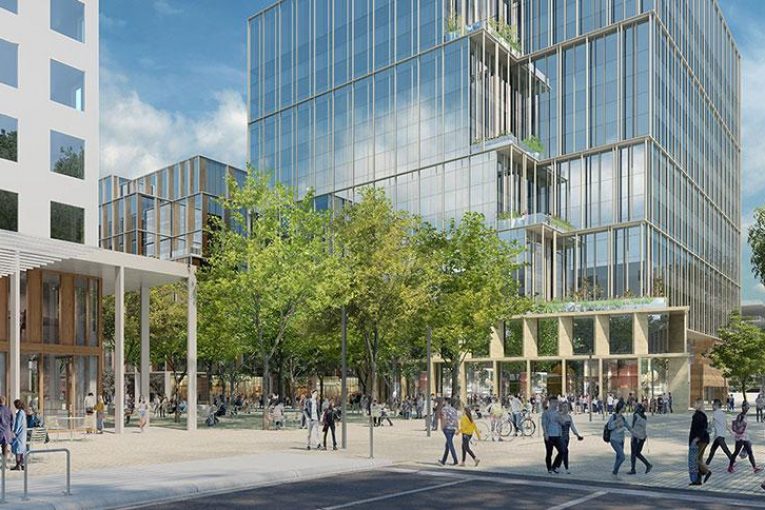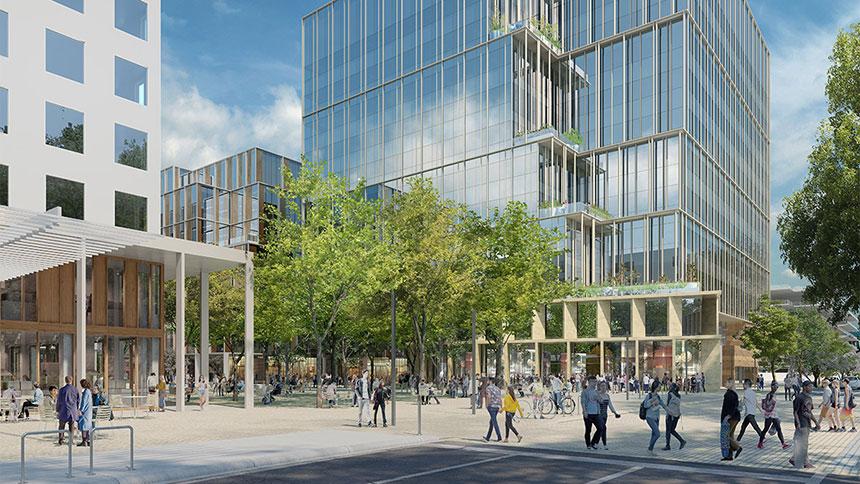

By David M. Greenwald
UC Davis won’t say it publicly, but then again they don’t have to. They went to Sacramento to build Aggie Square in large part because they knew how difficult it would be to do so in Davis. That’s not the only reason—the proximity of the Medical Center undoubtedly had something to do with it, and perhaps a willing host city.
The loss of DISC (Davis Innovation & Sustainability Campus) undoubtedly reinforced in their minds that they made the right decision. Could UC Davis have done more to help DISC pass? Probably. But the messy fight probably suggested to them it was a better idea to keep their nose out and focus on Sacramento and Aggie Square.
But the emerging legal battle in Sacramento over Aggie Square shows that it is not just Davis that makes it difficult to build new commercial development. The state, to the extent that it is bleeding tech companies and industry and facing a housing crisis, is about to have a moment of reckoning.
I support strong environmental and labor laws as much as the next guy, but if that means we lose jobs and create a housing market that is unaffordable to the average person, then we are hurting the very people we are trying to help and we have to find a way to thread that needle better.
We do this in Davis all too much. In trying to preserve the community that people came here to live in and those who live here love, we have cut off housing projects and access to jobs—which has made the community increasingly less affordable and forced those who do live here to increasingly commute outside of the city, adding to road congestion and VMT and GHG emissions.
We can have great standards and be an environmental leader, but if we force people to drive 30 miles each day to work, are we really helping the environment? Some are no doubt hoping that the pandemic changes a lot of this—and it may.
Meanwhile, Sacramento is now facing a problem that we have seen in Davis so much—the project is bogged down in litigation.
The university is still hoping to break ground on Aggie Square this year, to start the construction of the $1.1 billion tech campus (wouldn’t that have been a nice chunk of capital to infuse into Davis?) onto 8.5 acres of land just south of the UC Davis Medical Center.
But right now those plans are in limbo as two lawsuits were filed—one by AFSCME (American Federation of State, County & Municipal Employees) 3299 and another from a neighborhood group.
As Todd Stenhouse, spokesperson for AFSCME 3299, said in a statement, “AFSCME Local 3299 represents more than 3,000 Sacramento area workers, including hundreds that live in the neighborhoods that will be most directly affected by the proposed Aggie Square development.”
He added, “This project purports to attract more than 5,000 workers and nearly a thousand students to one of the region’s most historically disadvantaged communities — inviting significant environmental health and displacement risks to local residents, most of whom are people of color living at or near the poverty line.”
One of the problems, of course, is while the project seeks to bring in thousands of jobs, the number of new housing units is in the hundreds.
This is the problem we face right now in California—the need to connect jobs to housing.
The very people that AFSCME represents seem likely to be benefited by the jobs brought in by Aggie Square.
The city of Sacramento pushes back. They are seeking to become a party on “the grounds that the city and community stand to gain significant economic benefit from Aggie Square,” according to a press release from Mayor Darrell Steinberg’s office.
“We’re seeking to intervene because this is the single largest economic development opportunity in a generation in our city, and we must fight to prevent it from getting bogged down in unproductive litigation that doesn’t help anyone,” Steinberg said, in a statement.
The project is also attempting to bring in new development to the existing neighborhoods, but that has caused concerns of displacement of existing businesses and residents.
That has led some on the council, particularly Jay Schenirer and Eric Guerra, to participate in talks to create some sort of community benefit agreement that would prevent gentrification of the existing neighborhood.
This whole process is a good demonstration of why California sees itself in the predicament that it is in. Even a community like Sacramento is struggling to put a major infill project into its community, that would pump literally billions into the local economy.
So, while we criticize Davis for getting in its own way on these things, it is maybe the more extreme example—but hardly alone in creating an environment that will make the next wave of economic development much harder.
—David M. Greenwald reporting
Support our work – to become a sustaining at $5 – $10- $25 per month hit the link:


I thought we were done with this Vanguard campaign?
Also perhaps due to the massive public subsidy that they’re receiving from government agencies, in addition to free land on UC Davis’ campus.
Adding jobs without adding more housing does the opposite of what you’ve stated, here (regarding affordability).
Davis is already experiences a net inflow of commuters, due to UCD.
Yolo county provides excellent public transit, for those working in downtown Sacramento. (Perhaps those agencies will also remain more flexible after the pandemic is over, regarding work-from-home.).
In any case, “switching careers” midstream (e.g., leaving state employment) is not something that most workers are willing or able to do. Building another 5,000 parking-spot development is not going to “reduce traffic”.
So, it’s not just Davis that has leaders which fight its own residents.
Yeah – requiring community benefit sure sounds like a “predicament” to me. 🙂
I don’t criticize Davis in this manner – I celebrate it.
In fact, Davis takes a moderate approach to growth and development, and pursues it to a much greater degree than other communities (such as those in the Bay Area). It is only “slow growth” when compared to the sprawling communities which surround it.
But seriously, there’s a planned “technology park” (with 1,600 homes planned onsite) 7 miles up Highway 113. (The one that failed in Davis, before it even reached voters.) Of course, still no announced commercial tenants that I’m aware of, which leads me to believe that the profit from housing is the factor that’s driving it forward, as usual.
I thought it was just Davis 😐 Mommy mommy the Vanguard tells me so. And let’s get this straight. This isn’t a “commercial development”. It’s a subsidized government project. Big difference. This is what corporate welfare is. Don’t miss what is right before your eyes.
No moment of reckoning. More like decades of pain.
So destroy labor and the environment and help the people you are trying to help, problem solved. By the way, did you ever ask the people you are trying to help if they want your help?
Shame on those people who do this too much. Stop the thissing, all of you.
Measure JeRkeD actually did that more than any other single factor. Yet you, DG, continue to support it. So I blame you while you blame “us”.
“Seem”. You tell ’em what they need! To quote the late great Neal Peart from the song “Witch Hunt”:
Those who know what’s best for us, Must rise and save us from ourselves
Rise DG, rise!
I glad the City of Sacramento wants to become a party. Will it be one of the mask parties like in “Eyes Wide Shut” ?
Hmmm . . . I wonder why. Perhaps because that’s what happens everywhere.
Government control to prevent gentrification. That should go well 😐
How about we take this heavily subsidized project that will help destroy actually affordable and nice lower middle class neighborhoods in Sacramento, build lots of expensive housing, and mitigate that destruction with heavy-subsidized so-called A**-fordable housing. (I am from now on adding asterisks to emphasize what it really is.) Subsidy to solve a problem, more subsidy to fix the problems it causes, in order to grow the economy! That works! Then we’ll have more tax dollars to plow under more ‘opportunity zones’ with subsidized projects. Yeah! Mommy!
Mainland China is a much better example. “We need this land for a project. Move out” Now that’s a process that prevent pesky things like delays and citizen participation.
Funny how these things only happen in the very communities you claim to wish to protect. You don’t see this sort of project proposed adjacent to or taking over wealthy suburbs such as Caucasian Acres in East Sac, for example.
“We” ??? “Its” ??? Care to define your pronouns? I could take a pretty good guess, but I’d rather it comes from the horses, um . . . . . mouth, as they say. (“They” ? – define your pronouns Mr. Miller! blah, blah!)
Davis is so extreme! With Measure JeRkeD and all. Stop creating an environment that will make the next wave of economic development much harder. Stop it! Stop it! Mommy!